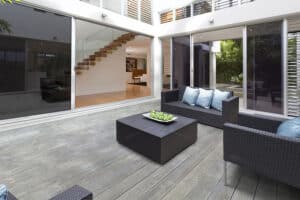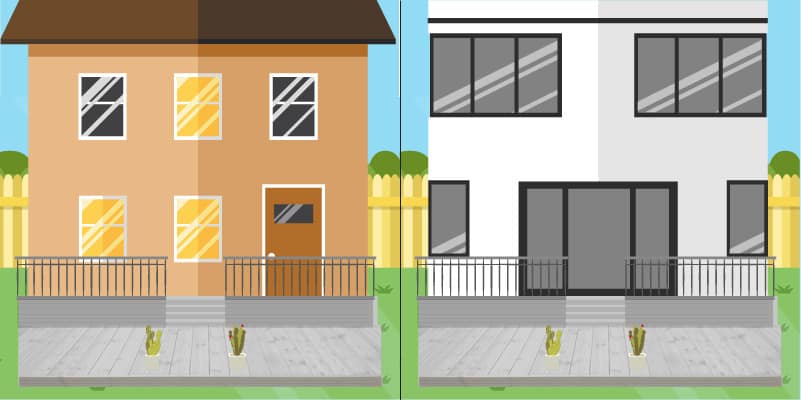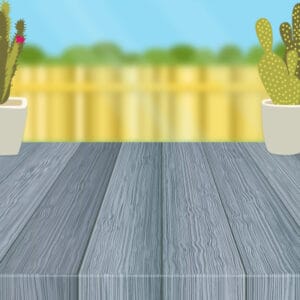
Most people might tend to associate the colour grey with thoughts of a cloud-covered sky, growing old gracefully, or perhaps a certain series of infamous romance novels. However, in terms of home improvement grey can be a homeowner’s best friend. This is particularly true for those looking to improve their outside living space with the addition of composite decking.
Though you might not know it, shades of grey and durable composite decking have been the perfect pair for quite some time. But why should you consider it? Well the Reddish Joinery team are here to help explain!
What is composite decking?
Before diving into the nitty gritty of why grey and composite decking are so good together, we thought we’d highlight what it actually is. After all, it’s a fairly modern solution that some homeowners might not be aware of.
For decades traditional decking has helped homeowners make the most of their outside living areas, being a great way to enjoy and soak in the sun on the occasional hot day. People tend to appreciate how quickly they can be constructed in comparison, to say, a conservatory. At its most practical, decking is an easy way to level out gardens that would otherwise boast a hazardous slope. Traditionally, decking would be constructed from natural wood. But now there’s a longer-lasting solution: Composite decking.
As its name suggests, composite decking can best its classical counterpart due to the multiple materials it’s made of. A stylish and practical composite wood product with a grained surface that makes it look authentically like natural timber, the subdued simplicity of grey garden decking never fails to look stunning against modern buildings. It’s more resistant to harsh weather elements, requires no maintenance, and can accommodate much larger weights. Perfect for those wanting to enjoy the beauty of wood without copious amounts of upkeep.
Surface level benefits of composite decking:
- Sustainable: Wood-feel without environmental impact
- Low-maintenance: No need to varnish or sand
- Durable: Resistant to flaking, rot, and splinters
- Lifespan: Lasts up to three decades
Neutral style for classic and contemporary homes

So why is grey considered the best composite decking colour choice? The most obvious reason is in its neutral style. Emotionless, cool, and balanced, grey is the colour devoid of colour. However, it’s because of this inherent neutrality that grey composite decking is always a safe bet. Vintage or modern, classic or contemporary, choosing to have your outside decking finished in grey helps minimise the chances that any established aesthetic will be ruined.
In a world where architecture styles can range from the likes of rural cottages to towering apartment complexes, grey’s neutral tone is an easy way to avoid the dangers of style somewhat, futureproofing homes for those planning to move in the near future. To outsiders, grey might seem like dull colour choice, but it can offer multiple aesthetic advantages in the long run.

Attractive woodgrain texture
A lot of people worry about missing that authentic feel of traditional timber when opting to have composite decking fitted. This is understandable considering the historic roots tied to decking’s purpose and design. But, this shouldn’t be a concern as far as grey composite decking is concerned. With composite decking, there’s plenty of opportunity to enjoy modern function as well as classic style.
This is because composite decking very much take inspiration from composite doors, in that the material structure might be complex but the outside appears as simple timber. Each panel is engrained with a wood-like pattern reminiscent of original timber decking and this is an effect that could only be pulled off when shaded to a vintage tone like Oak, Rosewood, or something a little more muted like White, Black, or – you’ve guessed it – Grey.

Unaffected by UV rays
Composite decking might not be natural, but it’ll certainly appear as such once fitted. This is in part thanks to the woodgrain texturing we mentioned above but also due to resistance against the sun’s UV rays. Homeowners with coloured uPVC windows will no doubt be familiar with the UV vulnerable plastics that begin to discolour, but there’s never any risk at losing the distinctly grey tone of your decking regardless of how much sun exposure it’s subjected to.
Fading or discolouration is a near-impossibility with modern composite decking, their boards formulated using UV stabilisers which help dissuade any harmful effects. In grey, composite decking can comfortably retain its understated vibrancy without the need for staining, varnishing, or any other time-consuming methods previously required with timber.
Grey composite decking for outside reinvention
There you have it! So while you might not think it, the reason you’re likely to see composite decking finished in grey as opposed to any other colour is simple when you know why. Today, there’s still a lot of demand for the unique benefits they provide, with a maddening 40 million decks in North America alone being more than 20 years old. For those looking to replace these existing structures or for homeowners only just looking to jump in, grey composite decking is a stylish and practical means of reinventing your outside.





